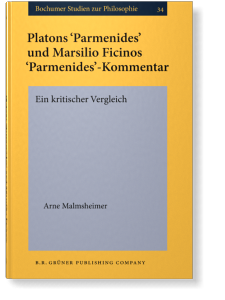Platons ‘Parmenides’ und Marsilio Ficinos ‘Parmenides’-Kommentar
Ein kritischer Vergleich
Ein ganz anderes Verständnis des ‘Parmenides’ offenbart Marsilio Ficino in seinem ‘Parmenides’-Kommentar. Ficinos Exegese folgt im wesentlichen der des Proklos, so dass Wirklichkeit hier nicht als von der Seele entworfene, sondern als hierarchisch gestufte beschrieben wird. Das vorliegende Buch geht dieser Deutung nach, um sie schließlich als unhaltbar zurückzuweisen.
The Platonic dialogue ‘Philosophos’, which Plato himself mentions in the ‘Sophistes’, is usually considered to be a lost work. A detailed analysis of the ‘Theaitetos’ as well as the so-called Eleatic dialogues reveals that Plato completed the trilogy ‘Sophistes’, ‘Politikos’ and ‘Philosophos’ with the ‘Parmenides’ — hence, that the lost ‘Philosphos’ is identical with the existing ‘Parmenides’. The dialectical exercise of the ‘Parmenides’ demonstrates a kind of theory of subjectivity in which the One reveals itself to be the human soul. The human soul — through the multiplicity of its sentences and their dialogical unity — therefore creates reality. Nevertheless, the human soul is dependent on the examination of this very reality in dialogue with another.
In his ‘Parmenides’-commentary Marsilio Ficino shows a quite different understanding of the ‘Parmenides’. Ficino’s exegetical approach mainly follows Proclus’ commentary. As a result, reality is not described as a creation of the human soul — on the contrary, it appears to be a well-organised hierarchy. This volume analyzes Ficino’s argumentation and finally rejects it.
Table of Contents
-
Einleitung | p. 1
-
Der Dialog Parmenides | p. 3
-
1. Zenons lesung (127A7–128E6) | p. 3
-
2. Sokrates’ Ideenlehre (128E6–130A2) | p. 10
-
3. Aporien der Ideenlehre (130A3–135C7) | p. 17
-
4. Die dialektische Übung (134E9–166c5) | p. 37
-
5. Anwendung der Übung auf die Aporien | p. 185
-
Der Parmenides-Kommentar des Marsilio ficino | p. 195
-
1. Inhaltliche Analyse | p. 195
-
2. Formale Analyse | p. 279
-
Vergleich von Basistext und Kommentar | p. 303
-
Schluß | p. 307
-
Literaturverzeichnis | p. 309
-
Namenregister | p. 317
-
Sachregister | p. 320
